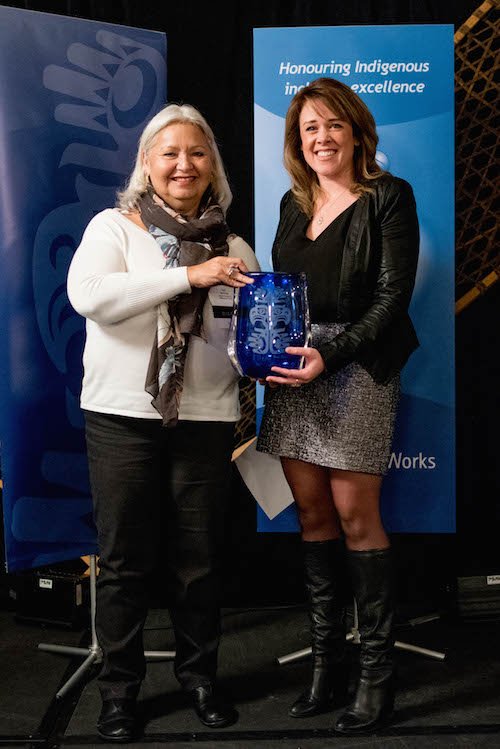Nationwide efforts by the IBEW to deepen ties with aboriginal communities in Canada have earned recognition for taking initiative to improve outreach and advancing indigenous people in the workplace.

|
| IBEW First District strategic coordinator Kate Walsh accepted an award on behalf of the members of IBEW in Canada, given by nonprofit Indigenous Works, at a ceremony Nov. 24 in Banff, Alberta.
|
Based on an in-depth review of the work of IBEW local unions – the first of its kind for any union in Canada -- a “barometer assessment and report” was produced to determine strengths, challenges and possible improvements. More than 20 IBEW leaders, from Alberta, Ontario, British Colombia, Manitoba, Saskatchewan, Nova Scotia and Yukon Territories, were interviewed about their efforts to recruit, train and employ members of indigenous tribes.
"The same principles and values that underpin First Nations culture — justice, equity, sharing responsibility — define the solidarity of labor activists. Unionism resonates well with our First Nations brothers and sisters and strengthens both," says Winnipeg Local 2034 Business Manager Mike Velie in a 2014 article in the Electrical Worker. Velie was among those whose efforts were recognized.
On behalf of the First District, strategic coordinator Kate Walsh accepted the award, given by nonprofit Indigenous Works, at the 2016 Workplace Inclusion Leadership Awards Nov. 24 in Banff, Alberta.
“The IBEW is committed to being an inclusive organization and that includes our indigenous brothers and sisters,” said First District Vice President Bill Daniels. “It’s an honor to be recognized by Indigenous Works for our efforts.”
The IBEW has been a member of Indigenous Works since 2010. Since that time, the IBEW has redoubled efforts to recruit, train and organize indigenous populations. Treaties between First Nations bands and federal and provincial governments frequently require corporations engaged in projects on reserve land to hire indigenous residents. Cultural awareness and developing mutual respect are essential to successful partnerships between the IBEW and First Nations communities.
The IBEW efforts include developing pre-apprenticeship training programs to promoting diversity in the skilled trades.
“Our job is to make our students the best possible tradespeople, and when you remove the social barriers, I see absolutely no difference between our First Nations students and anyone else,” said Halifax, Nova Scotia, Local 625 Business Manager Tim Swinamer.
Social and cultural differences are among those barriers. Or they can be simple logistics. Some First Nations students may travel two hours to get to class or have difficulty with certain skills, Swinamer said. So Local 625 provides mentoring and counseling services and even math tutoring.
“We didn’t want to set them up to fail,” he said, “and they didn’t.”
Local 625 is building a new training facility and several spots for incoming students are reserved for First Nations students, Swinamer said.
Walsh said the IBEW’s work with indigenous people mirrors other initiatives like RENEW/NextGen, the women’s caucus and the Electrical Workers Minority Caucus.
“This is part of our larger effort to be an organization that is open to all Canadians,” Walsh said.